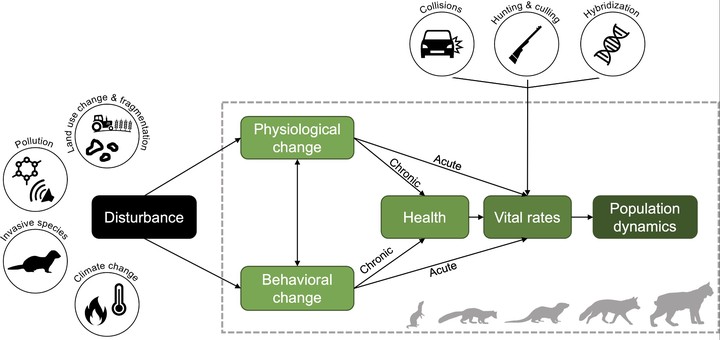DISCAR

Context. Conservation and the sustainable use of biodiversity and ecosystem services largely depend on the successful management of ecological populations, which in turn depend on our knowledge and our ability to understand and predict how the structure and dynamics of ecological populations respond to changes in their environments.
Rationale and aim. Despite its importance, the quantification of the effects of anthropic pressures on biodiversity is difficult and rarely undertaken because of the lack of species-specific ecological data and/or human pressures and activities, and the complexity and lack of transfer of analytical methods needed to evaluate these long-term consequences. The DISCAR (DIS = disturbance, CAR = carnivores) project aims at providing an operational framework with analytical tools for assessing the impacts or population consequences of human pressures, and showcasing it with case studies in applied conservation.
Case study. In DISCAR, we will use small carnivores in French mainland and overseas territories as a case study to assess the population consequences or impacts of human pressures on animal populations. Why small carnivores? Because these species hold important roles in ecosystems, such as influencing ecosystem structure and providing numerous ecosystem services, including pest/disease control and seed dispersal. Small carnivore species also respond to ecosystem perturbation in a fast, measurable, and interpretable way and therefore can be used as sentinels of global change.
Objectives. DISCAR will connect the fields of bioenergetics and demographic modeling in an integrated framework to assess human pressures on biodiversity, and to characterize then predict the impacts on small carnivores. DISCAR will identify key parameters underlying coupling between pressures and impacts, and will make recommendations for stakeholders in terms of monitoring and mitigation strategies.
Work packages. We will i) assemble a unique dataset on small carnivores including their ecology, bioenergetic requirements, demography and human pressures, ii) quantify and characterize the impacts of interacting pressures on populations, and iii) forecast the fate of populations to assess their viability under various scenarios of pressures and mitigation to help devise sound conservation strategies.
Consortium. To achieve these objectives, we have gathered international experts in ecological modelling and small carnivores who will develop and transfer an analytical framework for quantification, characterization and prediction of the impacts of pressures on populations. These experts are:
- Olivier Gimenez – CNRS (France)
- Sandrine Ruette – OFB (France)
- Cassie Speakman – CESAB/FRB (Australia)
- Courtney Marneweck – Giraffe Conservation Foundation (South Africa)
- Patrick Giraudoux – Université Bourgogne Franche-Comté (France)
- Isabel Smallegange - Newcastle University (UK)
- Sébastien Devillard – Université Claude Bernard Lyon 1 (France)
- Cara Gallagher - University of Potsdam (Allemagne)
- Sarah Cubaynes – EPHE (France)
- John Fryxell – University of Guelph (Canada)
- Elizabeth McHuron – University of Washington (USA)
- Rob Salguero-Gomez – University of Oxford (UK)
- Katrinas Davis – University of Oxford (UK)
- Marie-Lazarine Poulle – Université Reims Champagne Ardenne (France)
- Christophe Duchamp – OFB (France)
- Kévan Rastello – University of Victoria (Canada)
- Sarah Bull – University of Oxford (UK)
- Simon Lacombe – University of Montpellier (France)
- Maëlis Kervellec – University of Montpellier (France)
Funding. This project is funded by the French Foundation for Biodiversity Research (FRB) through Cesab.